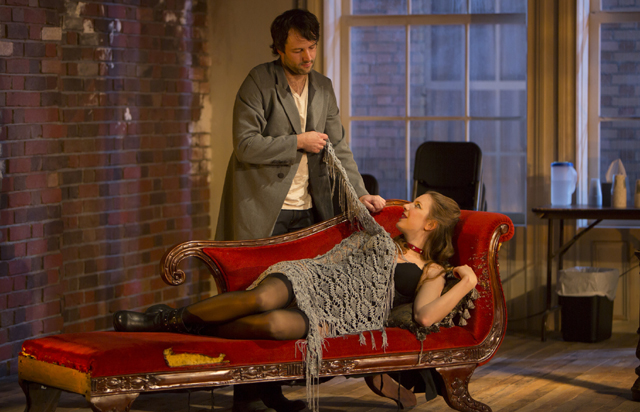Venus in Fur whips it good

The Philadelphia Theatre Company knocks David Ives’ ‘Venus in Fur’ out of the ballpark. Do you like sex? Kink? Kinky boots? Psychoanalytic Theory? Then, go see Philadelphia Theatre Company’s ‘Venus in Fur.’
I studied Venus in Furs back in graduate school and spent hours listening to brilliant psychoanalytic professors breakdown Deleuzian theory for me. Venus is one of those high concept texts, like Beloved, that’s practically unadaptable. So, when David Ives’ contemporary revision hit Off-Broadway in 2010, I greatly considered attending … but didn’t. This is the thing. I lived breathed, read and re-read that novel, Sade, Jelinek, Rochester, and anything even vaguely related to sexual kink. Could a contemporary adaptation even come vaguely close? The original 1870 text penned by Sacher-Masoch surrounds wide-eyed innocent Severin, who begs his idealized lover, Wanda, to either marry or dominate him. Unsurprisingly, she chooses the latter. The novel traverses their increasingly sadomasochistic relationship while it grows amazingly fantasist. Severin dreams of a female polar bear clawing his body. His lover’s Black female servants tie him to a plow and whip him. In the end, Wanda’s lover, The Greek, whips the shit out of him while she watches. Seriously. HOW do you put that on without OFFENDING EVERYBODY? How do you put that on while maintaining the utter AWESOMENESS of the original source material? Luckily, playwright David Ives and The Philadelphia Theatre Company have the answer.
About The Play
The play shifts to modern day and surrounds a writer/director, like Ives, who adapted the 18th century novel and is currently casting for the lead actress. In reducing the cast to two core characters, Ives pares down the novel’s increasingly fantasist scenes while making it accessible to contemporary audiences. For those who never read (or cared to read) the original novel, he intersperses humorous anecdotes and explanatory commentary throughout the play’s first half. Plus, for any English majors such as myself, he pokes fun at race, gender, and culture studies that incorporated Freudian and Deleuzian psychoanalysis to understand the novel. Then, he mocks the audience for reading the writer in the text (even though Sacher-Masoch forced his wife to dominate him and remembers his aunt beating her lovers).
Thomas, the allegedly liberal humanist playwright, is the first character we meet. But, you know him already. He’s the seemingly mild guy with chunky glasses who loudly proclaims his belief in women’s rights, while un-ironically stating women should watch their weight and urging his male children to watch Transformers over Silkwood. Basically, an unrealized self-loathing sexist. Exactly. He’s Richard Roeper. As the play progresses, he reveals his casual sexism to Vanda, the seemingly clutzy auditioning female actress who gradually unveils her understanding of the play, Thomas, and his inner, deep-seeded need to control and be controlled. The play shifts between their reading of the play, their analysis of its lines, and their gradual merging with the characters.
About the Show
The Philadelphia Theatre Company’s rendition stayed true to both Ives and Sacher-Masoch’s construction. Just as I feared Ives might reduce the original novel to sex and silk stockings, I equally feared PTC might simplify the material to sex, sex, sex through its billboard ad featuring a woman in fishnets. Luckily, I was wrong. It proved spot on from start to finish. Mark Alhadeff and Jenni Putney rocked as the main characters. I loved Mark’s Thomas from the start. At first, Jenni’s over-the-top, ditzy gal Friday by way of Brooklyn accent annoyed me. But, as the play continued, her accent becomes quieter and realer, revealing her initial character as a red herring to put the audience (and Thomas) off her scent. However, she was definitely luscious in her portrayal. Not in her sensuality, but her inhabitance of the Wanda/Vanda character(s). Her tiny glances when discussing “wetness” and female “creatures” delighted me. Likewise, Mark’s utter embodiment of the Wanda character awed me. There’s a line in the novel, “He is a man who is like a woman.” Mark rocked it so utterly and unabasheduly, that I truly fell in love with him. Hugh Dancy who? Broadway what? Do I hear a Barrymore Nominations calling?
The awesomeness doesn’t stop there. The set design was amazing — the hardwood floors, the radiator, the detailed electric boxes, the exit sign, the windows facing walls with more windows, the actual exit door and the rain … Man, for a small stage, this was the MOST realistic and detailed set EVER. Clearly, the stagehands are worth every penny. I know PTC and the Stagehands Union were at an impasse this year, but the newly revised theatre is amazing. The sound, the set, the electrical work, and everything else was spot on. The staging was amazing. While it started with over-the-top comedy it shifted to poses that revealed casual intimacy between the characters. Thomas reading over Vanda’s shoulder and Vanda wearing Thomas’ hoodie while “shrinking” him. You KNEW the director would eventuallys stage Vanda as Thomas’ psychoanalyst. Kip Fagan did a great job directing. I’m shocked he never read the novel previously. But, I also have to recognize Jason Simm’s set design, Thom Weaver’s lighting design, Bart Fasbender’s sound design, and Susan Cameron as dialect coach. The casting directors equally deserve nods for bringing in such an excellent cast.
Admittedly, part of me found the opening and interim bursts of humor disruptive, because the original novel’s intense from start to finish. Yet, it equally reminded me of how much I loved theatre. Theatre is all about pacing and building. Even when the actors reach what I believe is the pinnacle of emotion, they still have more to give to each other and the show. The ability to say the same line different ways while still topping the previous emotion while appearing incredibly authentic and dedicated to the moment isn’t easy. This is a demanding play. But, the actors gave 157%.
About the Adaptation
The literary adaptation remained utterly true to the novel, while adding more to it. When I first read the novel Wanda came across as a hyper-independent woman who already leaned towards domination, but, when I re-read it yesterday, she seemed more like a woman lead into it through Severin’s insistence. Intriguingly, Ives incorporates both perspectives into his play through his leads. Equally interestingly, Thomas immediately discounts everything academic ever written/said about the play, calling it pedantic, trivial and label-making. However, making the playwright character a skeptic of his own text (and the novel that inspired it) also makes the play more accessible. Ives doesn’t reserve his play for the hallowed academic halls even as Vanda slowly strips away Thomas’ deliberate blindness.
There are so many levels of mirrors in the script (the Thomas character mirroring the original character Severin mirroring the original author Sacher-Masoch mirroring the play’s author David Ives). As well as Vanda mirroring Wanda mirroring the original Venus with mirror (in furs) painting. The more Vanda synchs with Wanda, the original 19th century heroine, the more Thomas wants to dominate, direct and abuse her. Just as Sacher-Masoch re-used “coquettish,” Vanda continuously calls Thomas “coy.” Although Thomas appears to mirror Severin, in truth he’s Severin’s pure mirror opposite. While Severin starts as a submissive, he ends as a dominant while Thomas works opposite. There’s an odd humorous bit in the middle which I didn’t quite understand until I saw the ending.
I feared the Philly production wouldn’t stand up to the standards of Off-Broadway or Broadway. I was TOTALLY wrong. Just as the novel introduced the following question — “Was it my idea or yours? Did I persuade you or did you inflame my imagination?” — so the play introduces its own. You leave wondering where are they going? How are they getting out of that room? The senior citizen beside me kept crying ‘Where are they going next?’ So, if you’re in the New York-New Jersey-Connecticut-Pennsylvania-Delaware region, do try to see this production. It’s amazing. It ends Sunday, June 23rd. Students get a discounted rate.
 CliqueClack
CliqueClack



